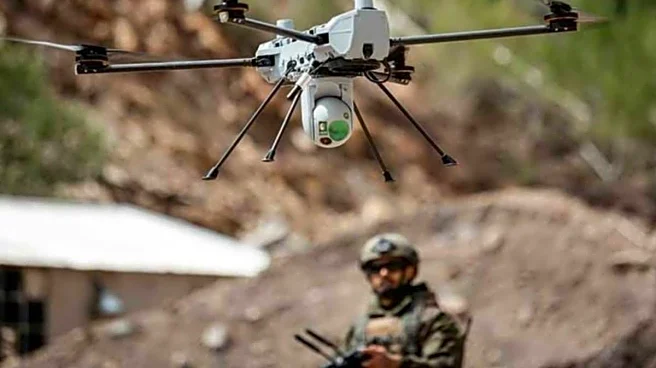Punjab has witnessed a sharp surge in cross-border arms smuggling from Pakistan. According to official data, 362 weapons were seized in 2025, compared to just 81 in 2024. More than 50 individuals were arrested in 2025 for arms smuggling, including drone couriers and intended recipients assigned terrorist missions within the state. Authorities attribute this escalation to retaliatory actions by Pakistan’s Inter-Services Intelligence (ISI) following India’s Operation Sindoor, which targeted terrorist hideouts in Pakistan and Pakistan-occupied Kashmir (PoK).
Data compiled by the Khalistan Extremism Monitor (KEM) reveals a notable rise in both incidents and arrests. Between January and September 2025, 519 persons were arrested in 246 arms seizure
cases involving 634 weapons, including 540 pistols, seven rifles, four revolvers, four guns, 49 hand grenades, three RPGs, seven knives, five IEDs, 11.77 kilograms of RDX, and 14 unspecified weapons along with 4,059 rounds of ammunition. During the same period in 2024, authorities arrested 499 individuals across 186 incidents involving 519 weapons and 2,203 rounds of ammunition. The data indicates a broad escalation in both scale and lethality of cross-border trafficking.
Punjab’s 532-kilometre border with Pakistan has increasingly become a frontline for drone warfare. As of October 13, 2025, the Border Security Force (BSF) intercepted 200 drones carrying 174 weapons, 12 hand grenades, and over 10 kilograms of explosives. The trend shows a rapid escalation: 294 drones were recovered in 2024, 119 in 2023, 22 in 2022, one in 2021, seven in 2020, and two in 2019.
Besides drone infiltration, smugglers have exploited flood-hit border areas to move consignments across swollen rivers using boats, tyre tubes, and swimmers. In one instance, on September 11–12, 2025, Punjab Police arrested four persons in Fazilka district and seized 43 pistols, 38 magazines, and 2,317 cartridges smuggled through floodwaters.
Investigations have revealed a deep nexus between Pakistan’s ISI, Khalistani terrorist outfits such as Babbar Khalsa International (BKI), and transnational gangsters based in Canada, the United States, the United Kingdom, and elsewhere. This network facilitates the flow of arms to militant cells while also fuelling organised crime across Punjab. Recovered weapons have been linked to cases of extortion, targeted killings, and inter-gang violence. Officials warn that these criminal gangs increasingly act as foot soldiers for terrorist operations, advancing ISI’s objective of destabilising Punjab and reviving secessionist activity.
Punjab Director General of Police Gaurav Yadav announced on October 14 that since September 2024, Punjab Police had dismantled 26 terrorist modules, arresting 90 individuals and seizing arms, explosives, and ammunition. Authorities have also identified 203 foreign handlers involved in terrorism and organised crime, with efforts underway, in coordination with central agencies, to issue Red and Blue Corner Notices through Interpol.
In response to persistent drone incursions, the Punjab government launched an Anti-Drone System (ADS) titled Baaz Akh (“Hawk Eye”) on August 9, 2025. Three vehicle-mounted ADS units were deployed in Tarn Taran district under the first phase, with six additional units scheduled for rollout. However, officials emphasise that at least 100 ADS units are required for comprehensive border coverage. Since deployment, Tarn Taran Police have registered 12 drone-related FIRs, leading to seizures of arms, ammunition, and narcotics.
Punjab Chief Minister Bhagwant Mann has also called for establishing a Centre of Excellence for Drones and fast-tracking the long-delayed National Security Guard (NSG) hub in Pathankot.
Recent incidents indicate that Pakistan-origin drones now employ AI-enabled navigation systems, allowing them to automatically return to their launch sites when Indian radar attempts signal jamming or interception. This innovation has significantly complicated detection and interception efforts.
The expanding drone and arms smuggling operations form part of a broader hybrid warfare strategy along India’s western frontier. The convergence of terrorism, arms trafficking, narcotics trade, organised crime, and state-sponsored technological proxies has created a multidimensional threat environment. Addressing this challenge demands continuous innovation in countermeasures, enhanced inter-agency coordination, and investment in advanced surveillance technologies.
As Pakistan’s campaigns in Jammu and Kashmir falter, its shifting focus toward Punjab suggests that the state has become the next strategic frontier in Islamabad’s efforts to destabilise India.
Nijeesh N is a research associate at the Institute for Conflict Management. Views expressed in the above piece are personal and solely those of the author. They do not necessarily reflect News18’s views.




/images/ppid_a911dc6a-image-177081457256338436.webp)
/images/ppid_59c68470-image-177081525337143071.webp)

/images/ppid_59c68470-image-177081508095753303.webp)
/images/ppid_59c68470-image-177081517392040553.webp)
/images/ppid_59c68470-image-177081512358914704.webp)
/images/ppid_59c68470-image-177081521903588681.webp)

/images/ppid_59c68470-image-177081503618238277.webp)